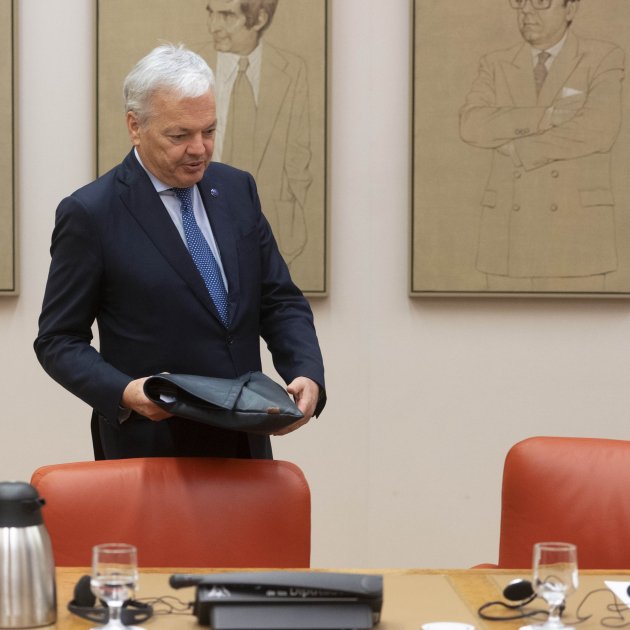The EU commissioner for Justice, Didier Reynders, has urged "all the parties" involved in the confrontation between the Spanish judiciary and government to do what is necessary to move forward with the renewal of the General Council of the Judiciary (CGPJ), which he has underlined as a "priority issue". Reynders was thus referring to the Spanish prime minister, Pedro Sánchez; the leader of the opposition PP, Alberto Núñez Feijóo, and the judges of the CGPJ, while concern is growing in EU institutions about the drift Spain is entering. It is the second day in a row that the EU justice commission has commented on the Spanish crisis.
"I regret to hear that in Spain negotiations on the renewal of the Council for the Judiciary, which has been acting in ad interim functions since 2018, have been suspended," remarked Reynders. For this reason, the Justice commissioner urged "all the parties involved to take the necessary actions for the successful implementation" of the renewal of the CGPJ, an issue that Brussels has demanded of Spain for years. "The European Commission has recommended that Spain proceed with the renewal of the Council for the Judiciary as a matter of priority and start, immediately after the renewal, a process aimed at adapting the appointment of its judges-members, taking into account European standards," he added
On Tuesday, the EU's justice commission had already reprimanded Pedro Sánchez for not having consulted "the relevant interested parties, including, as appropriate, the judiciary and the judicial councils" when carrying out the reform of the Penal Code, whose passage through the legislature was blocked by a Constitutional Court injunction on Monday. While noting that it was not EU policy to comment on legislative proposals while they are in process, spokesperson Christian Wigand did affirm that "when it comes to reforms of the judicial systems in the Member States, we have always maintained that it is important that relevant stakeholders are consulted, including, as appropriate, the judiciary and judicial councils". EU sources added that, before a major reform in the judicial field, "prior" consultations should have taken place with actors such as the General Council of the Judiciary (CGPJ), prosecutors and judges and the Council of Europe through the Venice Commission.
German press sees "systemic crisis"
Meanwhile, the German press does not see the institutional confrontation taking place in Spain as simple tension between the two main political parties, PSOE and PP, but as a serious systemic crisis. Doubts are beginning to emerge in the German chancellery about the crisis of Spanish democracy, despite the efforts made by the Spanish prime minister, Pedro Sánchez, to present the country to the EU as having done its democratic homework. The open war between the judiciary and the Sánchez government is once again eroding the image of Spain.
The leading newspaper Die Zeit states bluntly that Spain is immersed "in a deep crisis". "Analysts see the institutional foundations of Spanish democracy at risk. And on this, both the Spanish government and the opposition agree, for a change. But when the question of who is to blame for the disaster is raised, all consensus disappears", it reports. "For the first time since the return of democracy to Spain after the Franco dictatorship, the Constitutional Court has prohibited Congress from following a legislative process. In doing so, it has interfered with the rights of the Parliament elected by popular vote. The leader of the PP, Alberto Núñez Feijóo, congratulated himself that "democracy has been strengthened". And the Socialist MP Felipe Sicilia compared it to the failed coup attempt in 1981 carried out by the Civil Guard and the military", added the German newspaper.
Similar views are given by the major German media group RND, close to the Social Democrats, which speaks of a "systemic crisis" in Spain. "Spain is experiencing a power struggle between political power and the judiciary, which is undermining the rule of law. In fact, it is strictly focused on appointments to the Constitutional Court, but in reality Spain is immersed in a systemic crisis." The RND news story recounts with surprise that the judges referred to as "progressives" and those called "conservatives" on the Constitutional Court hold separate meetings as "if they were not a court but a political debating club".
